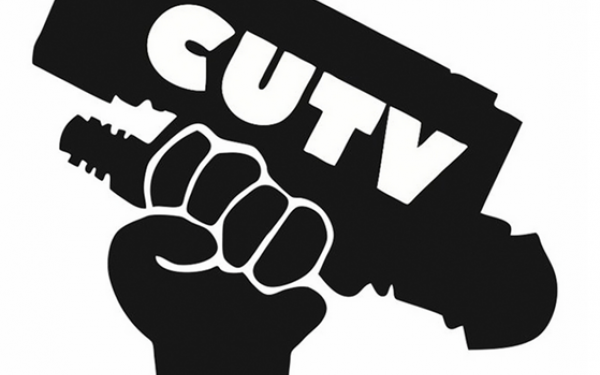CUTV in Legal Limbo
Station Imperilled Following Resignation of Emergency Board Member
Sometimes, when the going gets bad, the bad gets worse.
Following yet another week of name-calling, finger-pointing, conspiracy theories and general tumult, Concordia University Television has come to a grinding halt with the sudden resignation of another member of its Board of Directors.
On Monday night, Wendy Kraus-Heitmann, one of two members of CUTV’s emergency provisional Board of Directors, sent out a letter to members and staff simply titled “Resignation.”
“I have thought long and hard about this and all that my actions entail, and at this point I think the kindest and most sensible course of action I can take is to figuratively shoot the puppy,” read her resignation letter.
CUTV, a mostly student-run community television station operating out of Concordia gained international recognition for their live coverage of Quebec’s student protests this spring. But they have tripped and fallen hard on difficult times over the past few months.
Earlier this year, a transitional agreement was set in place between CUTV and its umbrella organization, the Concordia Student Broadcasting Corporation, which oversees CUTV and CJLO, Concordia’s radio station.
The transition, effective June 1, would see all of CUTV’s assets and management transferred to a new and independent not-for-profit organization—Community University Television.
A provisional Board of Directors was put in place to oversee the transition, but as of Oct. 20, all three members had resigned, followed quickly by the resignation of then-station manager Laura Kneale.
According to a CSBC motion, Kneale resigned following “increasing tension with staff members,” which led to a loss of financial control that, according to the motion, imperiled student funds—$0.34 per credit from each undergraduate student at Concordia.
The station was locked down for several days and its account—which holds student fees—was frozen.
Despite being frozen by the university, the account remains open for payroll. From it, CUTV has been paying out roughly $1,000 per day to approximately 10 paid employees.
An emergency Board was appointed, composed of Kraus-Heitmann and CUTV and CSBC member Sabine Friesinger, and took control of the station, with a mandate to mend it and get it back on the transitional track.
In recent weeks, however, the situation at CUTV has completely unraveled.
“I feel that things have gotten to a point where we can’t agree on a course of action on how to solve the problems at CUTV,” said Kraus-Heitman in an interview with The Link.
Tensions amongst staff, members and the Board have been steadily rising over the past two weeks.
In many ways, the situation has become unbearable.
“Just shoot it, start it over and if people want to start a new CUTV, let them,” said Kraus-Heitmann. “I’m not going to let this thing keep limping along any more.”
Despite repeated attempts to contact Friesinger, The Link was unable to reach her by press time.
“I would say the process is severely stalled; I would say that the engine fell out on the highway. I think it’s time to start it all over, to start from scratch.”
–Wendy Kraus-Heitmann, Ex-Provisional CUTV Board of Directors Member
Legal Limbo
The resignation of one of two Board members leaves CUTV in a sort of legal void, and a way to move forward is at this point unclear.
“This is an extremely disturbing situation for the CSBC,” said Justin Giovannetti, president of the CSBC and of The Link ’s Board of Directors. “In many ways it is an unprecedented situation. They’re operating without a roadmap of what to do from here on in, and there are definitely a lot of question marks hanging.”
According to Giovannetti, as it stands, CUTV is an organization left with no functioning Board of Directors, no clear bylaws, no standing regulations and no real procedures going forward.
Friesinger and Executive Director Laith Marouf are the only members with keys to the station.
With only one Board member, no real decisions can be made. CUTV’s members cannot necessarily vote in a new Board, either.
The transition process was supposed to see the new CUTV draft a set of bylaws, elect a proper Board and hold a referendum to allow students to vote on the absorption of the former CUTV’s student fee levy.
Since the transition to independence was incomplete, CUTV’s finances are still in the trust of the CSBC. However, the situation is further complicated by the amount of parties technically implicated in the situation.
“Most of their assets are within property that is owned by Concordia University,” said Giovannetti. “To make matters worse, most of their funding—which is not theirs, but is in the trusteeship of the CSBC—is actually collected by the university from Concordia students. So Concordia has some additional obligations that have never really been brought up, until this time.
“To muddy the waters even more, you have the Quebec government that could in some ways have a certain level of interest in the situation, because you have a Board of Directors that is at this point, illegal.”
Quebec law states that a not-for-profit corporation should have a minimum of three members on its Board of Directors.
The Way Forward
The fate of CUTV in the coming days is ultimately unclear, and by the time this story hits newsstands it’s entirely likely that things may have changed.
For now, Giovannetti says that a large number of decisions will have to be made by all parties in the very immediate future.
“I will be meeting with Concordia University in the near future and we’re going to have to discuss where to go now,” he said. “I can start speculating, but frankly, I don’t know where I’d start, because I honestly just don’t know.”
He added that the safety of assets and the protection of student funds are of utmost importance.
“At this point, that is one of the most important things. We’re talking about hundreds of thousands of dollars of student money,” said Giovannetti.
Despite all the mudslinging and confusion, Kraus-Heitmann still believes CUTV—that is, the people, the spirit and the heart of the station—will live on. Only how that will happen, and in what form, is still unclear to her.
“I would say the process is severely stalled; I would say that the engine fell out on the highway,” said Kraus-Heitmann. “I think it’s time to start it all over, to start from scratch.”

_900_598_90.jpg)




_600_375_90_s_c1.jpg)
_600_375_90_s_c1.jpg)